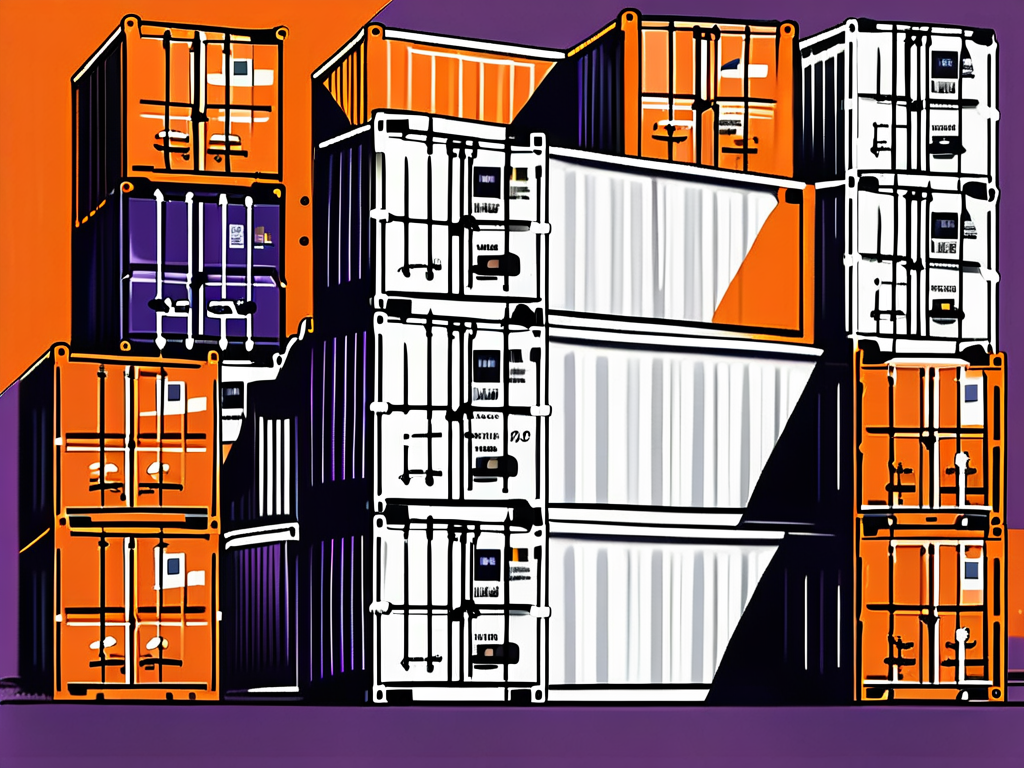Hey there! Welcome to our blog!!
We're glad you're here. If you think your brand is ready for a fulfillment partner, you can click here to learn more!
How Much Does It Cost to Insure a Freight Container?
- Written By: Helvis Smoteks
Helvis Smoteks

Shipping goods in containers has become an essential part of global trade. However, ensuring the safety and security of goods during transit is crucial. This is where freight container insurance comes into play.
Whether you are a shipping company, an importer, or an exporter, understanding the cost of insuring freight containers is important for managing your financials and protecting your investments. In this article we will discuss:
- The factors that influence freight container insurance costs
- The basics of freight container insurance
- Different types of insurance for freight containers
- Ways to reduce freight container insurance costs
Table of Contents
ToggleFind Out How Much It Costs to Insure a Freight Container
The cost to insure a freight container ranges from 0.5% to 2% of the cargo’s value and is based on the shipping route, and the insurance coverage chosen.
Let’s explore the key factors that influence its cost.
Freight container insurance costs are not solely determined by one factor but rather by a combination of various elements that contribute to the overall risk profile of the shipment. Understanding these factors is crucial for businesses to make informed decisions regarding their insurance coverage.
The Role of Container Value in Insurance Costs
The value of the container and its contents plays a significant role in determining the insurance premium. The higher the value, the greater the risk for the insurer, resulting in higher premiums. It is essential to accurately assess the value of the goods and ensure that they are adequately covered.
In addition to the value of the goods, the age and condition of the container itself can also impact insurance costs. Older containers may be more prone to damage or theft, leading to increased premiums to mitigate these risks.
Impact of Shipping Routes on Insurance Costs
The shipping route your container takes also affects insurance costs. Certain routes may pose higher risks due to factors such as piracy, political instability, or adverse weather conditions. Insurers take these factors into consideration when calculating premiums.
If you are shipping goods through a route with a higher risk profile, you can expect to pay more for insurance coverage.
Furthermore, the mode of transportation used along the shipping route can influence insurance costs. For example, transporting goods via sea freight may have different insurance requirements and costs compared to air freight or land transportation.
Understanding the specific risks associated with each mode of transportation is essential for determining the most appropriate insurance coverage.
How Cargo Type Affects Insurance Costs
The type of cargo being transported influences insurance costs. Perishable or high-value goods may require specialized handling or extra security measures, increasing the risks involved. Consequently, the insurance premiums for such cargo are higher compared to less valuable or non-perishable goods.
Moreover, the susceptibility of certain cargo types to damage or theft can impact insurance costs. Fragile or hazardous goods may require additional precautions and safeguards during transportation, leading to higher premiums to account for these increased risks.
Understanding Freight Container Insurance
Freight container insurance provides coverage for the risks associated with transporting goods in containers. It protects against various perils that may lead to loss or damage during transit, such as theft, natural disasters, accidents, and mishandling. By having insurance, you can minimize financial losses and ensure that your cargo is protected.
When it comes to freight container insurance, it’s crucial to understand the intricacies involved in safeguarding your cargo. Not only does this insurance shield you from potential financial burdens, but it also offers a layer of security and assurance as your goods travel across different terrains and through various handling processes.
The Basics of Freight Container Insurance
Before we delve into the cost aspect in terms of it is worth it, let’s establish the fundamentals of freight container insurance. It typically covers the container itself, as well as the goods inside it, while they are in transit.
The amount of coverage depends on the value of the goods and the level of risk involved. The insurance can be tailored to meet your specific needs, whether you require coverage for a single trip or want an annual policy.
Moreover, freight container insurance often extends its coverage to include not just the physical damage or loss of goods but also potential liabilities that may arise during transportation. This comprehensive approach ensures that you are protected from a wide range of risks, giving you peace of mind throughout the shipping process.
Why Freight Container Insurance is Worth It
Freight container insurance is not just an added expense; it is a necessity. Without insurance, you are taking on a considerable financial risk. Imagine the scenario of a container getting damaged due to a storm or stolen during transit.
The cost of replacing the container and the value of the goods inside could be exorbitant. Insurance provides you with peace of mind, knowing that you are protected against unforeseen events.
Furthermore, in the complex world of international shipping, where multiple parties are involved in the handling and transportation of goods, having freight container insurance acts as a crucial safety net.
It ensures that you are not left vulnerable to the uncertainties of global trade and logistics, offering a layer of protection that is invaluable in today’s interconnected marketplace.
Different Types of Freight Container Insurance
Freight container insurance comes in various forms to cater to different needs. Let’s take a closer look at the types of insurance available.

Ensuring the safety and security of your cargo during transportation is crucial in the logistics industry. Having the right insurance coverage can provide peace of mind and financial protection in case of unforeseen circumstances.
Single Trip Insurance
Single trip insurance provides coverage for a specific shipment or journey. It is ideal for businesses that transport goods occasionally. This type of insurance offers flexibility and ensures that you are protected for the duration of the specific trip.
Whether you are sending a one-time large shipment to a new client overseas or participating in a trade show requiring transportation of goods, single trip insurance can be tailored to meet your temporary insurance needs.
Annual Coverage Insurance
If your business involves regular shipping activities, annual coverage insurance might be suitable for you. This type of insurance provides continuous coverage throughout the year for all your shipments. It eliminates the need to obtain insurance for each individual trip, making it a convenient and cost-effective option for frequent shippers.
By opting for annual coverage insurance, businesses can streamline their insurance process, save time on paperwork, and have the assurance that their shipments are protected year-round, no matter how many trips they make.
Container Specific Insurance
Container-specific insurance focuses solely on the container itself rather than the contents. It provides coverage against damages caused to the container, including theft, accidents, or structural damage. This type of insurance is beneficial if you own or lease containers and want to protect your assets from potential risks.
For businesses that heavily rely on shipping containers to transport goods, having container-specific insurance can safeguard their investments in these essential assets.
Whether it’s protecting against damages from rough handling during loading and unloading or theft during transit, this specialized insurance coverage can offer comprehensive protection for your containers.
How to Reduce Freight Container Insurance Costs
To enhance the security and efficiency of your shipments while potentially reducing insurance premiums, consider these strategies:
- Implementing Risk Management Strategies: Enhance shipment security with tracking systems, safety protocols, and proper packaging. Installing GPS devices and conducting regular maintenance checks can minimize loss and enhance customer satisfaction.
- Choosing the Right Insurance Provider: Research and compare insurers to find one that offers competitive pricing and tailored coverage for your business needs, especially if you ship specialized cargo like perishable goods.
- Negotiating Insurance Rates: Leverage a good safety record and risk management practices to negotiate lower premiums. Explore group insurance plans through partnerships or industry associations for potential discounts and benefits.
Protect Your Investment: The Advantages of Freight Insurance
In conclusion, the cost of insuring a freight container depends on various factors such as the value of the goods, shipping routes, and cargo type. Understanding these factors and choosing the right type of insurance can help you manage costs while safeguarding your business.
By being proactive in risk management and negotiating with insurance providers, you can optimize your coverage and minimize expenses.
So, whether you are shipping goods across continents or considering expanding your business internationally, ensure that you are well-informed about freight container insurance to make informed decisions for your company’s financial well-being.
We hope you enjoy reading our blog!
Looking for the latest e-commerce news or an amazing 3PL partner? Fulfyld has you covered!





